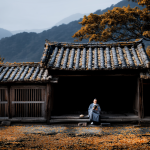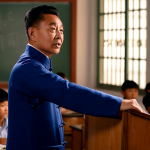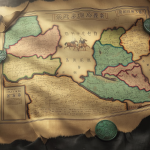桃花源记
《桃花源记》讲述一位渔人偶然发现与世隔绝的桃花源之地。此处土地肥沃,民风淳朴,村民祖先为躲避秦朝战乱而来此,后与外界隔绝。渔人将所见所闻告诉太守,众人前去寻找却迷路。高尚士人刘子骥欲前往探看,却因病亡故,此后无人再寻。陶渊明借桃花源表达对和平、平等生活的向往,反映对现实的不满与对道家自然生活的追求,并成为中国文学中代表理想境界的典范。
《桃花源记》原文

晋太元中,武陵人捕鱼为业。缘溪行,忘路之远近。忽逢桃花林,夹岸数百步,中无杂树,芳草鲜美,落英缤纷。渔人甚异之,复前行,欲穷其林。
林尽水源,便得一山,山有小口,仿佛若有光。便舍船,从口入。初极狭,才通人。复行数十步,豁然开朗。土地平旷,屋舍俨然,有良田、美池、桑竹之属。阡陌交通,鸡犬相闻。其中往来种作,男女衣着,悉如外人。黄发垂髫,并怡然自乐。
见渔人,乃大惊,问所从来。具答之。便要还家,设酒杀鸡作食。村中闻有此人,咸来问讯。自云先世避秦时乱,率妻子邑人来此绝境,不复出焉,遂与外人间隔。问今是何世,乃不知有汉,无论魏晋。此人一一为具言所闻,皆叹惋。余人各复延至其家,皆出酒食。停数日,辞去。此中人语云:“不足为外人道也。”
既出,得其船,便扶向路,处处志之。及郡下,诣太守,说如此。太守即遣人随其往,寻向所志,遂迷,不复得路。
南阳刘子骥,高尚士也,闻之,欣然规往。未果,寻病终。后遂无问津者。
中文翻译
东晋太元年间,武陵郡有个人以打鱼为生。一天他顺着溪水行船,忘记了路程的远近。忽然遇到一片桃花林,生长在溪水的两岸,长达几百步,中间没有别的树,花草鲜嫩美丽,落花纷纷地散在地上。渔人对此(眼前的景色)感到十分诧异,继续往前行船,想走到林子的尽头。
桃林的尽头就是溪水的发源地,于是便出现一座山,山上有个小洞口,洞里仿佛有点光亮。于是他下了船,从洞口进去了。起初洞口很狭窄,又走了几十步,突然变得开阔明亮了。(呈现在他眼前的是)一片平坦宽广的土地,一排排整齐的房舍。还有肥沃的田地、美丽的池沼、桑树竹林之类的。田间小路交错相通,鸡鸣狗叫到处可以听到。人们在田野里来来往往耕种劳作,男女的穿戴跟桃花源以外的世人完全一样。老人和小孩们个个都安适愉快,自得其乐。
村里的人看到渔人,感到非常惊讶,问他是从哪儿来的。渔人详细地做了回答。村里有人就邀请他到自己家里去(做客),设酒杀鸡做饭来款待他。村里的人听说来了这么一个人,就都来打听消息。他们自己说他们的祖先为躲避秦时的战乱,领着妻子儿女和乡邻来到这个与人世隔绝的地方,不再出去,因而跟外面的人断绝了来往。他们问渔人现在是什么朝代,他们竟然不知道有过汉朝,更不必说魏晋两朝了。渔人把自己知道的事一一详尽地告诉了他们,听完以后,他们都感叹惋惜。其余的人各自又把渔人请到自己家中,都拿出酒饭来款待他。渔人停留了几天,向村里人告辞离开。村里的人对他说:“我们这个地方不值得对外面的人说啊!”
渔人出来以后,找到了他的船,就顺着旧路回去,处处都做了标记。到了郡城,到太守那里去,报告了这番经历。太守立即派人跟着他去,寻找以前所做的标记,终于迷失了方向,再也找不到通往桃花源的路了。
南阳人刘子骥是个志向高洁的隐士,听到这件事后,高兴地计划前往。但没有实现,不久因病去世了。此后就再也没有问桃花源路的人了。
英文翻译
During the Taiyuan period of the Eastern Jin Dynasty, there was a fisherman in Wuling. He made a living by fishing. One day, he rowed his boat along the stream and soon forgot how far he had gone. Suddenly, he came across a peach blossom forest. It stretched for several hundred steps along both banks of the stream. There were no other trees among the blossoms, and the fragrant grass was fresh and beautiful, with fallen petals scattered all around. The fisherman was very surprised and went on further, wanting to explore the end of the forest.
When he reached the end of the forest, he found a mountain. There was a small cave in the mountain, from which faint light seemed to be coming. So he left his boat and entered the cave. At first, it was very narrow, only allowing one person to pass through. After walking for dozens of steps, it suddenly opened up into a bright and spacious place. The land was flat and open, and the houses were neatly arranged. There were fertile fields, beautiful ponds, and mulberry and bamboo groves. Paths crisscrossed, and the crowing of roosters and the barking of dogs could be heard everywhere. People were coming and going, planting and working in the fields. The clothes worn by men and women were exactly the same as those of people outside the Peach Blossom Spring. Old and young alike were all happy and content.
When the villagers saw the fisherman, they were extremely astonished and asked where he came from. The fisherman answered them in detail. Then some villagers invited him to their homes, killed chickens and prepared wine to entertain him. When the other villagers heard that there was such a person, they all came to ask about him. They said that their ancestors, in order to avoid the chaos of war during the Qin Dynasty, had brought their wives, children, and fellow villagers to this secluded place, never to leave again. As a result, they had been cut off from the outside world. They asked what dynasty it was now. They didn't even know about the Han Dynasty, let alone the Wei and Jin Dynasties. The fisherman told them everything he knew in detail, and they all sighed with regret. The other villagers also invited the fisherman to their homes one after another and offered him food and drink. After staying for a few days, the fisherman said goodbye and left. The villagers told him, "It's not worth mentioning our place to outsiders."
After leaving the cave, the fisherman found his boat and retraced his route, marking his way at various points. When he reached the county town, he reported the whole story to the prefect. The prefect immediately sent people to follow him, but when they tried to find the marks he had made, they got lost and could no longer find the way to the Peach Blossom Spring.
Liu Ziji from Nanyang was a noble and virtuous recluse. When he heard about this, he was delighted and planned to go there. However, he fell ill and died before he could make the trip. After that, no one ever inquired about the way to the Peach Blossom Spring again.
背景补充
- 创作时代背景:东晋末年,社会动荡不安,战乱频繁,百姓生活困苦。东晋政权偏安江南,内部政治腐败,门阀制度森严,士族阶层垄断了政治和经济资源,广大劳动人民处于水深火热之中。在这样的背景下,人们渴望摆脱现实的苦难,追求一种和平、安宁、美好的生活。
- 创作意图:陶渊明通过描绘桃花源这一理想世界,表达了他对黑暗现实的不满和对美好生活的向往。桃花源是一个与世隔绝、没有战乱、没有剥削压迫、人人平等、自给自足的社会,反映了作者的政治理想和对人生的思考。同时,《桃花源记》也体现了道家思想中对自然、淳朴生活的追求,以及对世俗功名的淡泊。
- 文学影响:《桃花源记》是中国文学史上的经典之作,它开创了中国文学史上“世外桃源”这一独特的文学意象,对后世文学产生了深远的影响。此后,“世外桃源”成为了人们心中理想境界的代名词,许多文人墨客在作品中都借鉴了桃花源的意象,表达对美好生活的向往和追求。









